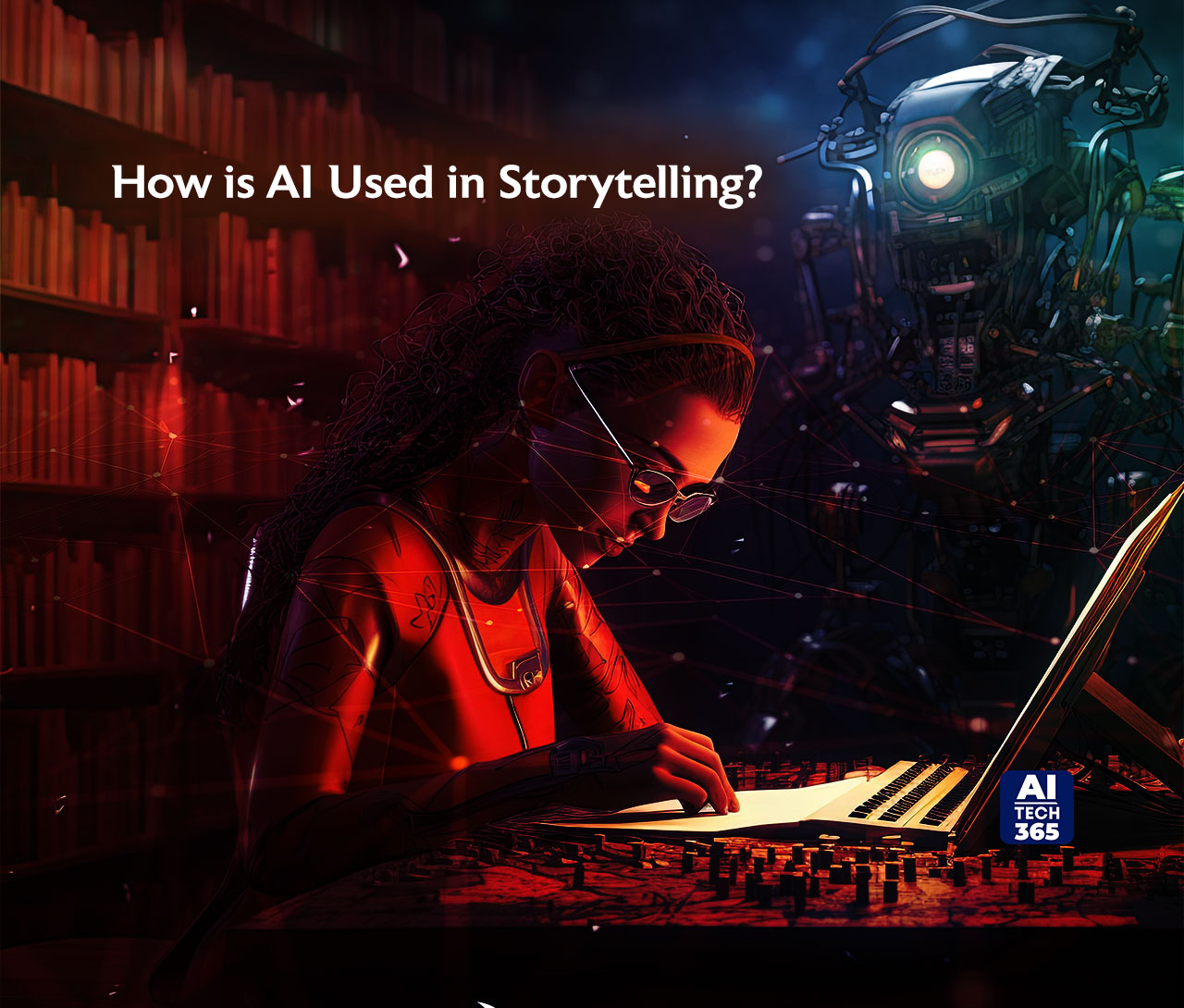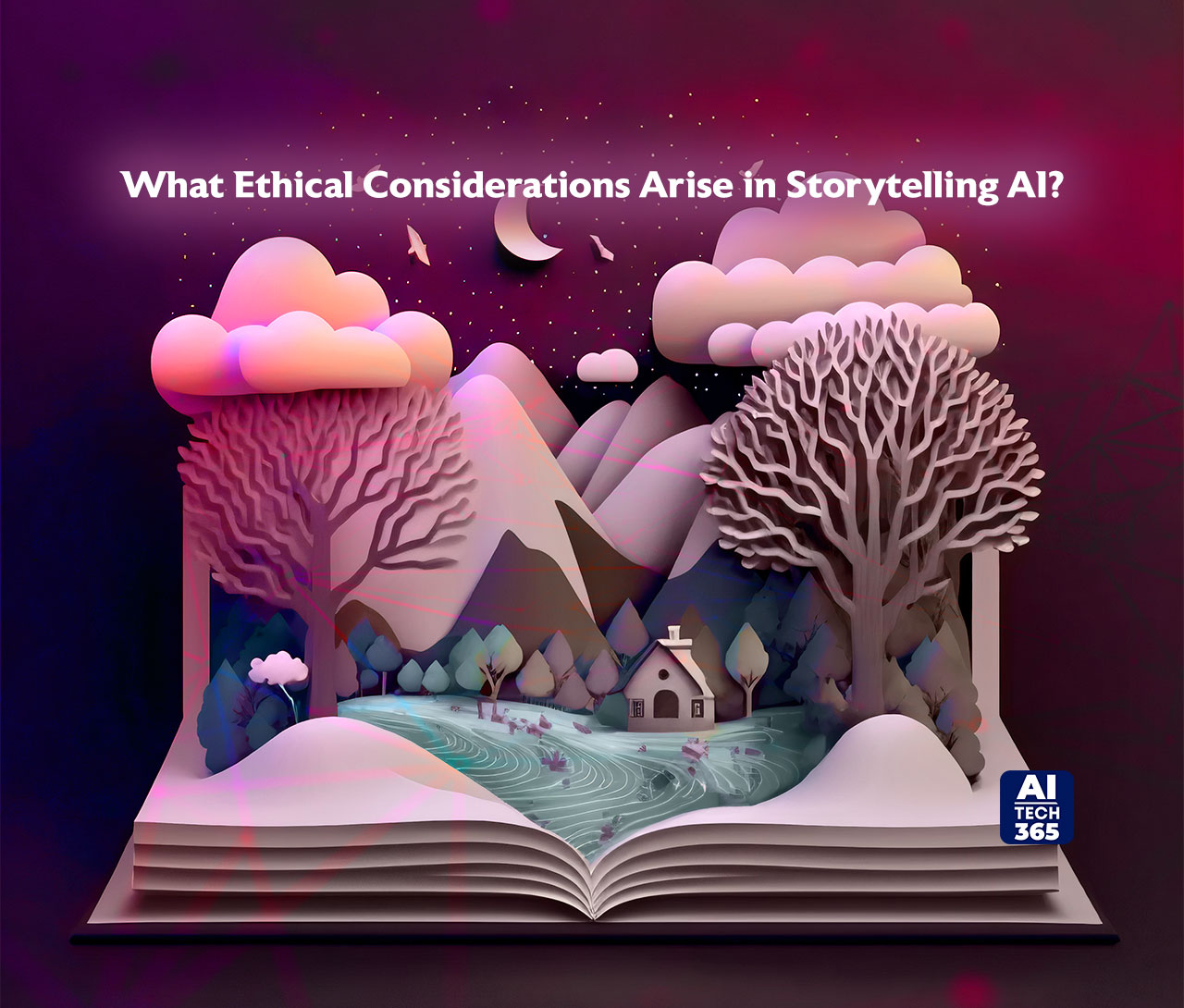In a world celebrated by artificial intelligence tools like ChatGPT, Gemini, and much more, the emergence of storytelling AI is not a new thing. AI story generators are renowned for their unique storytelling capabilities.
These advanced platforms help writers make detailed plots, develop characters, and tell emotional stories. They’re like a digital toolbox that gives writers what they need to create engaging stories that feel real.
Without further ado, let’s understand everything about this.
What is Storytelling AI?
Storytelling AI leverages artificial intelligence (AI) to create, improve, or assess stories. This technology can contribute to different facets of storytelling, including crafting plotlines, characters, dialogues, and even complete screenplays.
Additionally, it can evaluate the emotional resonance and audience engagement of narratives. The objective of storytelling AI is to support human storytellers in their creative endeavors, offer fresh storytelling avenues and elevate the overall storytelling journey.
How is AI Used in Storytelling?
AI-generated stories are essentially narratives crafted by machines to mimic human writing. The process hinges on two pivotal technologies: natural language processing (NLP) and machine learning.
NLP enables machines to grasp and interpret human language, not just recognizing words but also understanding their context and meaning. For instance, while humans easily decipher idioms like “It’s raining cats and dogs” as heavy rain, machines need training to grasp these nuances.
On the other hand, machine learning, a subset of AI, empowers machines to learn from data and enhance their performance over time. By analyzing vast datasets, machines can predict outcomes or make decisions based on new data they encounter.
To create AI-generated stories, machines undergo training using extensive datasets of existing stories, ranging from classic literature to contemporary fan fiction. When prompted to generate a new story, the machine employs NLP to comprehend the context of the prompt and draws from its training to craft a narrative. Throughout this process, machine learning refines and enhances the output based on feedback and additional data.
In essence, storytelling AI amalgamates NLP and machine learning, enabling machines to produce narratives that increasingly resemble human-authored tales.
Advantages and Disadvantages of Storytelling AI
AI-generated storytelling has the potential to change how we make and enjoy stories. Like any new technology, it has good and bad sides.
One big plus is how fast and efficient it is. Machines can churn out stories much quicker than people, which could help industries like advertising or news that need lots of content.
Another perk is that AI stories can be more varied and inclusive. Since machines don’t have human biases, they can tell stories from more perspectives.
However, there are downsides too. AI struggles to make stories unique and touching. It can also accidentally repeat harmful stereotypes based on the data it learns.
Plus, there’s a concern that AI might take over from human storytellers. While machines are fast, they lack the human connection in storytelling.
In the end, AI storytelling will keep growing, but we need to watch out for ethical issues and make sure it helps human creativity instead of replacing it.
What Ethical Considerations Arise in Storytelling AI?
AI-generated storytelling raises ethical issues, such as bias, transparency, accountability, and ownership.
Bias is a big concern because storytelling AI systems learn from existing data, which can perpetuate societal biases. For example, they might reinforce stereotypes unintentionally. It’s important to address these biases for fair and inclusive storytelling.
Transparency matters too. People should know when they’re reading AI-generated stories, especially in news reporting. Clear labeling and information about how stories are created build trust.
Accountability is key. Companies and organizations should take responsibility for any harm caused by AI-generated stories, and there should be ways for individuals to seek help if needed.
Lastly, there’s the question of ownership. Who owns the stories created by AI? Should credit go to the human who made the AI system? These issues need careful consideration.
What Are The Benefits Of Using AI for Storytelling?
- Unique and Creative Story Ideas: AI content generators offer a fresh source of story ideas for authors seeking inspiration.
- Time-saving: AI story generators help writers and content creators produce high-quality stories in less time, allowing them to increase their output without compromising quality.
- Personalized and Targeted Content: AI tools suggest ideas tailored to specific audience demographics, interests, and locations. This enables creators to craft content that resonates more effectively with their target audience.
- Creative Input: Storytelling AI tools provide creative input and inspiration, including plot builders and outline generators, to support writers in generating ideas for their stories.
- Enhanced Storytelling: AI tools offer features for capturing voice commands, audio, and video input, enabling interactive stories and multimedia experiences that engage audiences with compelling visuals.
How Does Storytelling AI Affect Human Creativity?
The future of AI-generated storytelling is causing debate about how it affects human creativity. Some people think it could help humans be more creative, while others worry it might make humans less important.
One possibility is that AI-generated storytelling inspires human creativity. AI can quickly make stories from lots of information, which might give human writers new ideas. These AI-made stories could be a starting point for humans to add their ideas and creativity.
However, some people are concerned that AI might take over from humans. If AI makes stories that people love, human writers might not be needed anymore. This could mean all stories start to seem the same, without the special touch of human creativity.
Also, AI acting like humans might make us think differently about what it means to be human. If machines can act like us, it could change how we see ourselves and how we relate to technology.
Even though there are worries, AI storytelling is here to stay. As technology gets better, we need to think about how it affects human creativity. By using AI in a way that helps human creativity instead of replacing it, we can make the most of this new technology while still valuing human creativity.
What is the Best Storytelling AI?
With a sea of storytelling AIs available in the market, it becomes quite tough to select the right one. Below we have compiled a list of the top five AI-generated storytelling tools.
Sudowrite
Sudowrite is the go-to choice for writers looking to enhance their storytelling with AI. If you haven’t tried Sudowrite yet, you’re missing out on a unique approach to augmented story writing. Our platform empowers writers to turn their ideas into polished manuscripts using specialized AI tools designed for storytellers.
Key Features:
- Character Name Generator
- Multi-Character Dialogue Support
- AI Tools for Pacing, Story Development, Chapter Outlining, and more
Sudowrite’s standout feature is the “Edit Story Selection with AI Story Engine.” This powerful tool integrates AI throughout the writing process, assisting with idea generation, outlining, chapter development, and even writing entire sections of your book. Our inline AI editor helps you refine selected text as you progress through multiple drafts of your story.
Best For: Novelists and Storytellers
Many acclaimed writers agree that the first draft is often the most challenging part, and Sudowrite streamlines this process while maintaining your creative control.
Pricing: Plan starts from $19 per month (free trial available)
Jasper AI
Jasper AI has been a prominent player in the AI writing landscape long before the rise of ChatGPT. Constantly evolving with new features, Jasper is renowned for its prowess in marketing and business writing. However, many are unaware of its capabilities for crafting compelling stories.
Key Features:
- AI Writing Templates for Business, Marketing, and Story Writing
- Customizable Brand and Voice Knowledge Pieces
- Long-form editor for Chapter-by-Chapter Story Creation
Jasper’s template library offers pre-trained writing tasks, including some tailored for story writing. While primarily designed for business content, many templates can be adapted for storytelling purposes.
Best For: Indie writers
Jasper’s AI assistance extends to crafting marketing and business material, making it ideal for promoting books and deals.
Pricing: Plan starting at $39 per month
Shortly AI
Shortly AI began as a storytelling AI and has since expanded its capabilities to handle various writing tasks. While it was acquired by Jasper a couple of years ago, it continues to operate as a standalone service.
Key Features:
- Easy-to-Use Slash Commands for Quick AI Writing
- Simplified UI for Distraction-Free Writing and Editing
- Unlimited Word Generation
Shortly AI’s document writer UI is designed for simplicity, offering only a few slash commands to streamline your writing process. This minimalist approach allows you to focus on your writing, calling on AI assistance whenever needed to seamlessly continue your work.
Best For: Writers seeking a distraction-free workspace combined with capable AI writing support
While it may not suit everyone, it offers a perfect balance for those who prefer to take control of their writing process while leveraging AI as needed.
Pricing: Plan starts at $79 per month
Final Takeaway
Storytelling AI presents a fascinating and promising frontier in the world of storytelling. By harnessing the power of artificial intelligence, storytellers can access innovative tools and techniques to enhance their creative process, develop captivating narratives, and engage their audience on a deeper level.


